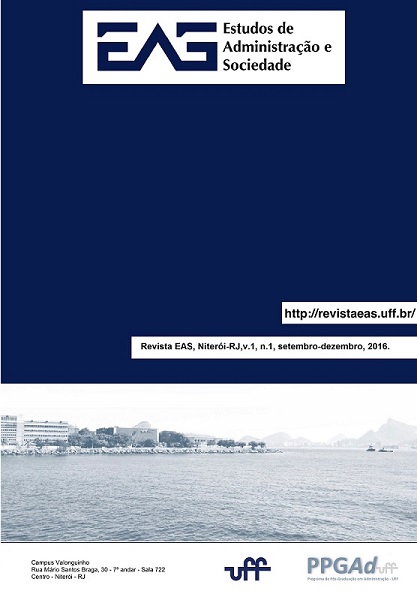Informality in the Brazilian Labor Market: An analysis of the reality of work in the city of Campina Grande-PB
DOI:
https://doi.org/10.22409/eas.v1i1.4Abstract
Since the early 1980s the changes in the labor market, resulting from productive capital restructuring, have characterized the labor market with a high fraction of workers without a formal contract. In Brazil, this problem could have been mitigated by the fact that there is a requirement for a formal contract for all employees. However, with the economic crisis of the eighties, there is significant increase in informality. There are many conditions that lead people to informality. One of the main surge of the mismatch between the demands of the formal labor market and the qualifying conditions. This work aims to analyze the reality of informal work in the city of Campina Grande-PB. This research is characterized as documentary. The information was obtained by searching the electronic site '' Atlas Brazil '', developed by IPEA. The results showed that although the percentage degree of employees 'formal' is higher than the degree of "informal" further study becomes relevant as to the causes that lead to the growth of the informal economy in the city under study, in view of the possibility these people are exposed to the precarious relations work. In conclusion, there is the need for the existence of appropriate public policies for the region, that aim to increase employment and assist to provide a higher level of the population's well-being as a whole, thus contributing to local development.Downloads
References
ASEA, P. K. The informal sector: baby or bath water? Carnegie-Rochester Conf. Series Public Policy 45, p. 163-71, 1996
BUGARIN, Noemi Sataka. Fatores Determinantes e Evolução da Economia Submersa no Brasil. Receita Federal, Ministério da Fazenda. Departamento de Economia, Universidade de Brasilia. Est. econ., São Paulo, V. 33, n. 3, p. 435-466, Julho – Setembro 2003.
COUTINHO, H. G. Mercado de trabalho, escolaridade e renda no Brasil- 1988 a 1998. Revista do Curso de Administração da Faculdade Maurício de Nassau, v. 2, p. 281-304, 2007.
DE SOTO, Hernando. The Other Path. (El Outro Sendero. Translated by June Abbott) NY: Harper and Row, 1989.
MAGALHÃES, Josiane. Relações de trabalho no Brasil: o movimento auto gestionário como resposta à globalização da economia e seus reflexos no mercado de trabalho. Revista Urutágua. Universidade Estadual de Maringá, 2001.
MELO, Hildete Pereira de; ROCHA, Frederico et al. O Setor Serviços no Brasil: Uma Visão Global – 1985/85. Instituto de Pesquisa Econômica Aplicada – IPEA, 1998.
MENEZES, Wilson F. DEDECCA, Cláudio S. A Informalidade No Mercado De Trabalho Brasileiro: Rendimentos e principais características. Nexos Econômicos. V. 6, n. 2, dez. 2012. CME-UFBA, 2012.
RIBEIRO, Roberto Name. Causas, Efeitos e Comportamento da Economia Informal no Brasil. Mestrado em Economia do Setor Público. Universidade de Brasília, 2000
SCHNEIDER, F.; ENSTE, D. H. Shadow economies: size, causes, and consequences. Journal of Economic Literature, 38, p. 77-114, 2000.
SMITH, Philip. Assessing the Size of the Underground Economy: the Canadian Statistical Perspectives. Canadian Econ. Observer, Cat. No. 11-010, 3.16-33 a 3.18.
Downloads
Published
Issue
Section
License
Autores que publicam nesta revista concordam com os seguintes termos:
- Autores mantém os direitos autorais e concedem à revista o direito de primeira publicação, com o trabalho simultaneamente licenciado sob a Licença Creative Commons Attribution que permite o compartilhamento do trabalho com reconhecimento da autoria e publicação inicial nesta revista.
- Autores têm autorização para assumir contratos adicionais separadamente, para distribuição não-exclusiva da versão do trabalho publicada nesta revista (ex.: publicar em repositório institucional ou como capítulo de livro), com reconhecimento de autoria e publicação inicial nesta revista.
- Autores têm permissão e são estimulados a publicar e distribuir seu trabalho online (ex.: em repositórios institucionais ou na sua página pessoal) a qualquer ponto antes ou durante o processo editorial, já que isso pode gerar alterações produtivas, bem como aumentar o impacto e a citação do trabalho publicado (Veja O Efeito do Acesso Livre).

